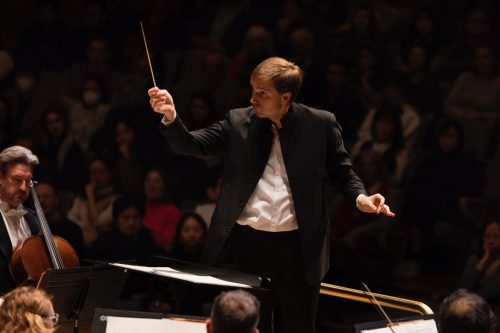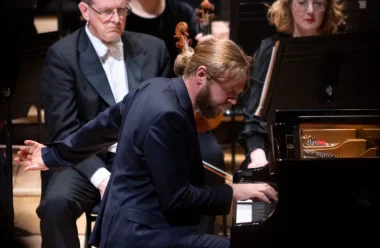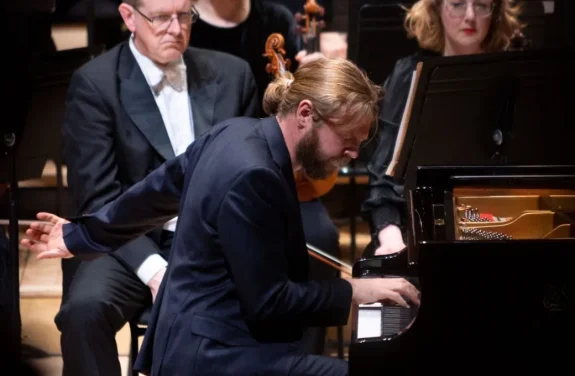 United Kingdom Smyth, Rachmaninoff, Elgar: Denis Kozhukhin (piano), Royal Philharmonic Orchestra / Vasily Petrenko (conductor), Royal Festival Hall, London, 27.3.2024. (MBr)
United Kingdom Smyth, Rachmaninoff, Elgar: Denis Kozhukhin (piano), Royal Philharmonic Orchestra / Vasily Petrenko (conductor), Royal Festival Hall, London, 27.3.2024. (MBr)

Smyth – The Wreckers, Overture
Rachmaninoff – Piano Concerto No.3
Elgar – Symphony No.2
This concert was quite superlative – but it really was not quite what it was supposed to have been. Yunchan Lim had been due to play Rachmaninoff’s Piano Concerto No.3, but a hand injury had forced him to cancel his European Tour. Perhaps I was a little more frustrated that I was not going to hear him play the Chopin Études at Wigmore Hall in April; I seem to find myself in something of a minority among my fellow critics (and especially audiences) in being unable to genuflect quite so quickly to his interpretation of this concerto, especially in some more recent performances I have heard (one from Boston comes to mind). Having said that, I would have been more than happy to have been proved wrong.
But what a gift of a performance of this endlessly fascinating concerto we did get from the Russian pianist Denis Kozhukhin. I generally take the view that if you rarely get a bad performance of this work then you rarely get a great one either; Kozhukhin’s very almost touched the latter. There is, in fact, some similarity between Yunchan Lim and Kozhukin in the sense that both these pianists are very attuned to what is going on within the orchestra – both engage with it when a considerable number of pianists never bother to do so. The idea that this is a symphonic piano concerto is clearly not lost on either of them. But if Kozhukhin looks within the orchestra he does something else too and that is to engage with his inner self; there was something deeply emotional and poetic about this performance that really put it in quite another class. The Karajanesque closing of the eyes, the length of time he just never spent looking at the keyboard at all when they were open, gave this performance an enormous freedom and intensity you rarely encounter in the concert hall.
That freedom is partly there because Rachmaninoff gives the pianist all the space to be as elastic or as tight as he wants. Unlike in the Second Concerto, the Third has no metronome markings. You didn’t, for example, find in Kozhukhin’s performance any correlation between the fast tempo he set for the opening bars and the noticeably measured one he set for the cadenza; with Evgeny Kissin it is clear there is a link. Although there is never really any reason why pianists should take on the interpretations of their mentors or teachers (Lim’s has little in common with Minsoo Sohn’s) so it’s also the case that Kozhukhin’s doesn’t share too much with Kirill Gerstein’s, as it happens the last pianist I heard in this concerto. But if any pianist did come to mind it was Yevgeny Mogilevsky (one of the greatest interpreters of the Third) and with whom Kozhukhin shares something of a tendency to spring from his stool – helpful if your right hand doesn’t comfortably stretch to a low D at the other end of the keyboard.

If this had been an unquestionably ‘Romantic’ performance, it was also one that was sometimes heavy on rubato – and I am perfectly fine with that. The cadenza – the longer of the two – was a real standout for this. It is extremely rare to hear such subtle playing of the f and mf bars, the dim and cres phrasing and even the accelerando – something a significant number of pianists are already doing by the cadenza’s 17th bar. There wasn’t a single tempo that Kozhukhin set here – nor a single dynamic. If it was slower and significantly ‘larger’ in scale than a normal performance of this cadenza it was because in order to hit the colours he wanted it could only be this way. Does he know the difference between Presto and Allegro molto? Absolutely. The meno mosso just rippled.
The second movement, too, was hugely impressive. Not all pianists take such a poetic view of this music – and not one that looks back to some of the Mendessohnian roots of the music, either. What perhaps set the pianist up here was Vasily Petrenko’s handling of the long orchestral opening to the second movement, some of the most tragic music Rachmaninoff wrote. He got superlative playing from the orchestra (magnificent strings) – and knew precisely the kind of bleak darkness he was aiming for. I don’t think Kozhukhin lacked power in the piu mosso section of the Intermezzo either – and there used to be a particularly ‘Russian’ style of playing the ff passage before the Maestoso that appears to have become a little unfashionable these days (that is, not as written) but we got something close to it.
The Finale alla breve had many fine things in it, too – and again a cadenza that was wonderfully done. Tempi were fleet for the opening, but not overly so; what was also noticeable here was the conversation between the pianist and the woodwind and the cello in duets, not something that is always so prominently done in performances, but in keeping with the landscape of Kozhukin’s interpretation. A beautiful pianissimo before the opening of the Meno mosso – unusually light, as if the fingers were floating on air, but with the depth of the left-hand bass so rich – was magnificent. The leggiero gave the impression of being played in double chords if not actually being done so.
That careful rubato was again there in the long passages with marcato markings, with Kozhukhin pointedly playing the notes with emphases alongside those with none. The Piu vivo before the concerto’s closing bars brought one surprise and that was neither conductor nor pianist sharing a single glance at one another in a passage where the concerto can easily fall apart (and sometimes has). But this had been a performance of perfect chemistry and never once did you feel it would ever do so.
Pianistically, this had been a tour de force. But for Vasily Petrenko and the Royal Philharmonic it was a remarkable orchestral accompaniment – the most memorable I have heard in recent times. The playing was superlative. I would be very surprised if I hear a better performance of this concerto for quite some time.
Elgar’s Symphony No.2 has been a work that Petrenko has conducted before – and one that seemingly travels well with non-British conductors. The symphony’s Edwardianism isn’t the only way it can be interpreted; I warmed to Giuseppe Sinopoli’s Italianate glow, just as I have to Tadaaki Otaka’s weightier one with the NHK Symphony Orchestra or Naoto Otoma’s more ascetic view of it.
In a symphony that can badly veer off course in some performances Petrenko took a very fluid view of it and he was helped enormously by playing that was neither overly heavy nor prone to indulgent phrasing. Indeed, perhaps there were hints of something a little Venetian that sprung from the symphony’s origins, and of the Shelley quote that prefaces the work – there was ample sunlight on display here, textures of light shining through them, but yet the despondency that is sometimes at the heart of this symphony could thunder out when it needed to.
The first movement was perfectly measured – it flowed with ease, neither speeded up or slowed down with uncompromising mannerisms. There was a lilting grace here, a horse gallop there; reflective passages merging with more strident ones. Petrenko achieved some beautiful playing – the ghostly, veiled writing in the muted strings; the unusual effect of bell-like tone on the harps. Elgar achieves a kind of terror in parts of this symphony’s opening movement that can be understated; Petrenko brought it into the open so when the anguished fff climax arrived it did so with even more power.
The Larghetto was intensely done, with mourning reflectivity and noble grace. Coy reserve and melancholic mistiness were emphasised by superb string playing. The music might be stately and sorrowful – the drum roll, and chordal string passages recalling march rhythms, but it was never overplayed. Lamentation, contemplation and even grief emerged but in the most varied way. Some inner conflict, and a return to terror, emerged in the third movement – it was taught, gripping with some wonderful woodwind playing, songs that were interjected with floating strings and punctuated brass. Petrenko achieved a level of integration that was impressively right: and there was volatility and violence but kept in check.
The concision of the final movement can be full of drama – and over grandiose statements. A lot of detail came through here, and a richness in the playing that was impressive (not least on the double basses). The flow was majestic and yet had an almost chamber-like quality with brilliant, flashing orchestral insights. From all that terror came a spiritual acceptance of tranquillity that was gloriously done.
The concert’s opening work, Ethyl Smyth’s Overture to The Wreckers was possibly the least persuasive piece on the programme. Swashbuckling and a tad cinematic it is also distinctly underwhelming; the performance was fine enough.
A wonderful concert – really fully deserving a BBC Radio 3 broadcast, but so typically excluded from the schedule for some reason.
Marc Bridle
